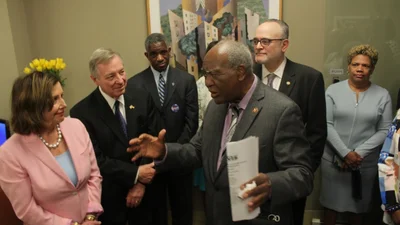Dear President Obama:
We write to express our concerns regarding very serious allegations of unfair trade practices by the government of China concerning clean energy products. We urge you to take all available measures to expeditiously investigate these allegations and take swift and appropriate action based on those findings.
Last month, a coalition of U.S. solar manufacturers filed petitions with the U.S. Department of Commerce and International Trade Commission seeking relief from illegal Chinese trade practices. The petitioners allege that Chinese imports of crystalline silicon solar cells are being dumped into the U.S. market far below their fair value, and that Chinese solar cell and panel producers receive massive subsidies from the Chinese government. Imports of Chinese solar products have surged more than 350 percent from 2008 to 2010. Imports through August this year exceeded those for all of 2010. As a result, whereas Chinese solar panel manufacturers had almost no share of the U.S. solar market five years ago, today they control more than half the market. The U.S. industry has lost thousands of jobs, and at least seven U.S. companies have been forced to close or downsize in the past 18 months.
It is critical for American businesses and workers to be able to fairly compete in this rapidly growing sector. The global solar market has expanded more than 1,000 percent in the last 5 years, with total megawatts shipped rising from 1,400 megawatts in 2005, to more than 17,000 megawatts in 2010. Already an $80 billion annual market, demand for solar panels is anticipated to continue growing as intense competition and technological breakthroughs further drive down prices.
As detailed in the solar industry’s petition and in recent press reports, the many advantages that the Government of China has provided to its solar industry include: massive loans at below-market interest rates; cheap or free land from local and provincial governments; extensive tax breaks and other state assistance; a currency that is substantially undervalued (by itself giving Chinese manufacturers roughly a 28 percent price advantage over their U.S. competitors); and access to the largest export credit agency in the world (three times the size of the U.S. Export-Import Bank). Given that China exports 95 percent of the solar panels it produces, these government policies clearly distort international trade.
This case comes at a critical juncture for the U.S. clean energy technology sector - and underscores the need to ensure a level playing field for American businesses and workers, not just in the solar arena but for all clean energy technologies, since many of the same issues confronted by the U.S. solar industry exist in other sectors as well. U.S. manufacturers and workers in the clean energy technology sectors are at a major competitive disadvantage as a result of these and other foreign government measures. Indeed, the subsidy disparity alone is dramatic. According to one recent report, the governments of China, Japan and Korea are likely to out-invest the United States by a margin of three-to-one from 2010 through 2015.
The enforcement of U.S. trade remedy laws is necessary, but not sufficient, to ensure equal footing for U.S. industry. We also must also devote more resources and attention to the enforcement of China’s obligations under WTO and other international agreements. In September 2010, the Steelworkers filed a petition with the U.S. Trade Representative (USTR) under Section 301 of the Trade Act of 1974. The petition described more than 80 Chinese laws, regulations and practices that discriminate against and disadvantage American workers and manufacturers of solar panels, wind turbines, and other clean energy technologies. These measures include massive trade-distorting subsidies, export restraints on rare earth minerals and other raw materials, and forced technology transfers. USTR has successfully addressed some of these claims through WTO litigation and consultations with China. But most of the claims remain unaddressed, subject to an ongoing informal investigation. One very important way in which to assist the U.S. clean technology sector is for the Administration to reinvigorate and expedite consideration of the outstanding claims in the Steelworkers’ petition.
Additionally, Congress and the Administration must work together to strengthen support for domestic clean energy technology manufacturing and deployment. Successful programs that have sustained the industry during the recent recession-like the 48C tax credit for advanced energy manufacturing investment in the United States and the 1603 Treasury Grant Program to incentivize domestic deployment-have either expired or will soon expire, leaving the industry facing even greater uncertainty.
We cannot strengthen our energy security, or create jobs and economic growth, by replacing Middle East petroleum imports with unfairly traded clean energy technologies imported from China. We look forward to working with you on these issues.
Sincerely,
The Honorable Sander M. Levin









